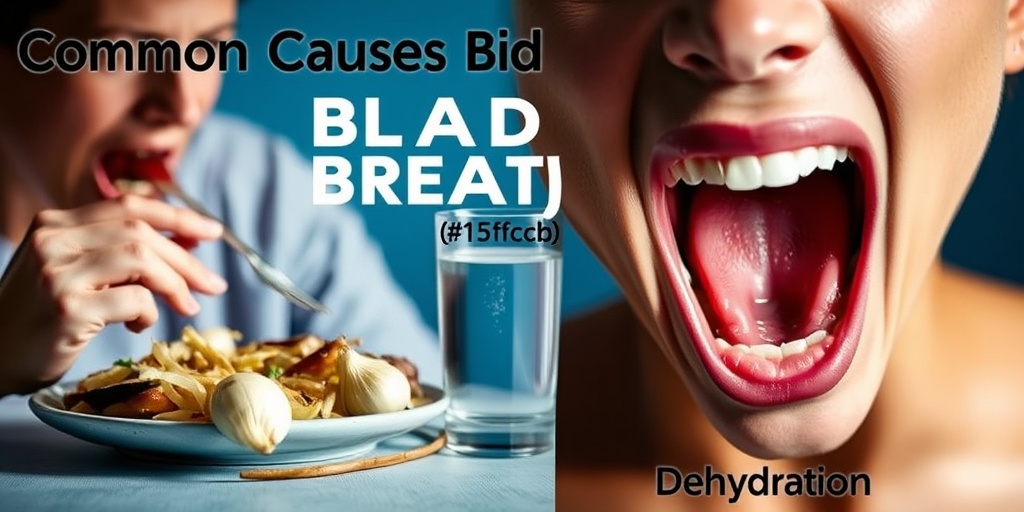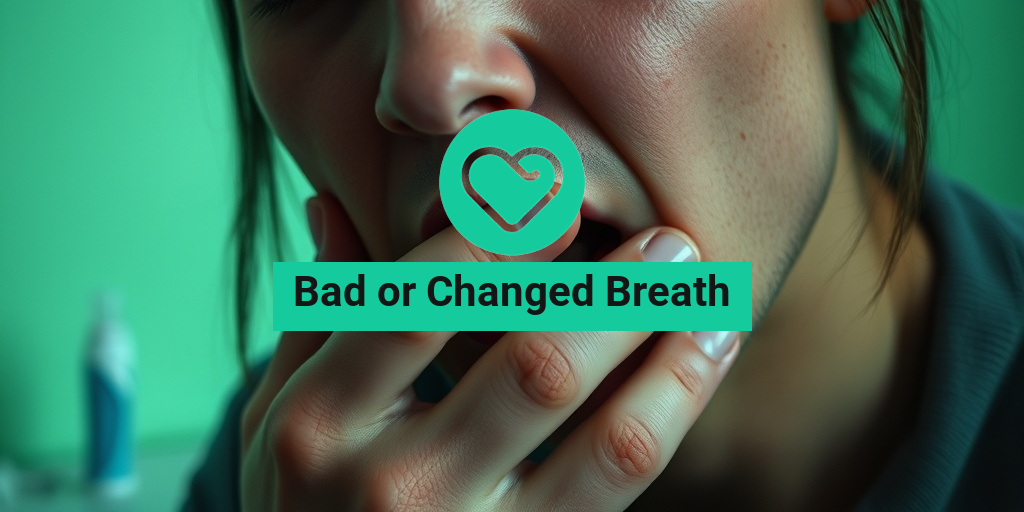What Is Bad Breath?
Bad breath, medically known as halitosis, is a condition characterized by an unpleasant odor emanating from the mouth. While it can be a temporary issue, often linked to certain foods or poor oral hygiene, persistent bad breath can indicate underlying health problems. It’s essential to understand that everyone experiences bad breath at some point, but when it becomes chronic, it can affect social interactions and self-esteem.
Bad breath can be caused by a variety of factors, and recognizing these can help in managing and preventing it. The odor is typically a result of bacteria breaking down food particles in the mouth, producing sulfur compounds that lead to that unpleasant smell. If you’re concerned about your breath, it’s important to consult with a healthcare professional to identify the root cause and explore effective treatments.
Common Causes of Bad Breath
Understanding the common causes of bad breath can help you take proactive steps to improve your oral hygiene and overall health. Here are some of the most prevalent reasons behind bad or changed breath:
Poor Oral Hygiene
One of the leading causes of bad breath is inadequate oral hygiene. When you don’t brush and floss regularly, food particles remain in your mouth, leading to bacterial growth. This can result in plaque buildup, gum disease, and tooth decay, all of which contribute to bad breath. To combat this, ensure you:
- Brush your teeth at least twice a day.
- Floss daily to remove food particles stuck between teeth.
- Use mouthwash to kill bacteria and freshen breath.
Dietary Choices
Your diet plays a significant role in the freshness of your breath. Foods such as garlic, onions, and certain spices can leave a lingering odor. Additionally, low-carb diets can lead to a condition called ketosis, which can also cause bad breath. To maintain fresh breath, consider:
- Limiting foods known to cause bad breath.
- Staying hydrated to help wash away food particles and bacteria.
- Incorporating crunchy fruits and vegetables, like apples and carrots, which can help clean your teeth naturally.
Dry Mouth
Saliva plays a crucial role in maintaining oral health by washing away food particles and bacteria. A condition known as xerostomia, or dry mouth, can lead to bad breath. This can be caused by various factors, including medications, certain medical conditions, or simply not drinking enough water. To combat dry mouth, try:
- Drinking plenty of water throughout the day.
- Chewing sugar-free gum to stimulate saliva production.
- Avoiding alcohol and caffeine, which can contribute to dehydration.
Medical Conditions
Sometimes, bad breath can be a sign of an underlying medical condition. Conditions such as sinus infections, respiratory infections, diabetes, and gastrointestinal issues can all contribute to bad or changed breath. If you notice persistent bad breath despite good oral hygiene, it may be time to consult a healthcare professional. They can help identify any potential health issues and recommend appropriate treatments.
Smoking and Tobacco Products
Using tobacco products not only contributes to bad breath but also damages your gums and increases your risk of gum disease. Quitting smoking can significantly improve your breath and overall oral health. If you’re looking for support in quitting, resources like Yesil Health AI (yesilhealth.com) can provide evidence-based health answers and strategies to help you on your journey.
Conclusion
Bad or changed breath can be a source of embarrassment, but understanding its causes is the first step toward finding a solution. By maintaining good oral hygiene, making mindful dietary choices, and staying hydrated, you can significantly improve your breath. If you find that your bad breath persists, don’t hesitate to seek professional advice. Remember, fresh breath is not just about confidence; it’s also a reflection of your overall health! 🌟

Symptoms of Changed Breath
Changed breath, often referred to as halitosis, can manifest in various ways. Recognizing the symptoms early can help you address the underlying causes effectively. Here are some common signs to look out for:
1. Unpleasant Odor
The most obvious symptom of changed breath is a persistent unpleasant odor. This can range from a mild bad smell to a more severe, foul odor that can be embarrassing in social situations. If you notice that your breath smells different than usual, it might be time to investigate further.
2. Dry Mouth
Dry mouth, or xerostomia, can contribute significantly to bad breath. Saliva plays a crucial role in washing away food particles and bacteria in the mouth. When your mouth is dry, these particles can accumulate, leading to an unpleasant smell. If you often wake up with a dry mouth or feel parched throughout the day, this could be a symptom of changed breath.
3. Metallic or Bitter Taste
Some individuals may experience a metallic or bitter taste in their mouth, which can accompany bad breath. This taste can be a sign of various health issues, including dental problems or gastrointestinal disorders. If you notice this change, it’s essential to consult a healthcare professional.
4. Coated Tongue
A coated tongue can also indicate bad breath. A white or yellowish coating on the tongue can harbor bacteria and food particles, contributing to an unpleasant odor. Regular brushing of the tongue can help mitigate this issue.
5. Gum Disease Symptoms
Gum disease, or periodontal disease, can lead to changed breath. Symptoms include swollen or bleeding gums, receding gums, and persistent bad breath. If you notice these signs, it’s crucial to seek dental care promptly.
Risk Factors for Bad Breath
Understanding the risk factors associated with bad breath can help you take preventive measures. Here are some common factors that can contribute to bad or changed breath:
1. Poor Oral Hygiene
One of the leading causes of bad breath is poor oral hygiene. Inadequate brushing and flossing can lead to the buildup of plaque and bacteria in the mouth, resulting in unpleasant odors. Regular dental check-ups and maintaining a proper oral care routine are essential for fresh breath.
2. Diet Choices
Your diet can significantly impact your breath. Foods such as garlic, onions, and certain spices can lead to temporary bad breath. Additionally, a diet low in carbohydrates can cause your body to produce ketones, which can also contribute to a fruity or foul smell. Staying hydrated and maintaining a balanced diet can help mitigate these effects.
3. Tobacco Use
Using tobacco products is another significant risk factor for bad breath. Smoking and chewing tobacco can dry out your mouth and lead to an unpleasant odor. Moreover, tobacco use can contribute to gum disease, further exacerbating the problem.
4. Medical Conditions
Several medical conditions can lead to changed breath. Conditions such as diabetes, GERD (gastroesophageal reflux disease), and respiratory infections can all contribute to bad breath. If you have a chronic condition and notice a change in your breath, it’s essential to discuss this with your healthcare provider.
5. Medications
Some medications can cause dry mouth as a side effect, leading to bad breath. If you’re taking medications that affect saliva production, it’s important to stay hydrated and consider discussing alternatives with your doctor.
6. Age
As we age, our bodies undergo various changes, including a decrease in saliva production. This can lead to a higher risk of bad breath. Older adults may also have more dental issues, which can contribute to unpleasant odors.
By being aware of the symptoms and risk factors associated with bad or changed breath, you can take proactive steps to maintain your oral health and ensure fresh breath. Regular dental visits, proper oral hygiene, and a balanced diet are key components in combating this common issue. 🌟

Diagnosis of Bad Breath
Bad breath, medically known as halitosis, can be an embarrassing condition that affects many people at some point in their lives. Understanding the diagnosis of bad breath is crucial for addressing the underlying causes and finding effective solutions. Let’s explore how bad breath is diagnosed and what factors contribute to this common issue.
Understanding the Causes
Before diagnosing bad breath, it’s essential to identify its potential causes. Some common factors include:
- Poor Oral Hygiene: Inadequate brushing and flossing can lead to food particles remaining in the mouth, promoting bacterial growth.
- Dental Issues: Cavities, gum disease, and other dental problems can contribute to unpleasant odors.
- Dry Mouth: Saliva helps cleanse the mouth; a lack of it can lead to bad breath.
- Diet: Certain foods, such as garlic and onions, can cause temporary bad breath.
- Medical Conditions: Conditions like sinus infections, diabetes, and gastrointestinal issues can also be culprits.
Consulting a Professional
If you notice persistent bad breath, it’s advisable to consult a healthcare professional or a dentist. They will typically follow these steps for diagnosis:
- Medical History: Your doctor will ask about your medical history, oral hygiene habits, and any medications you are taking.
- Physical Examination: A thorough examination of your mouth, throat, and nasal passages will be conducted to identify any visible issues.
- Smell Test: Some dentists may perform a smell test by asking you to breathe into their hand or a device designed to measure breath odor.
- Saliva Tests: In some cases, saliva tests may be conducted to assess the levels of bacteria in your mouth.
Identifying Underlying Conditions
In certain cases, bad breath may be a symptom of an underlying health issue. Your healthcare provider may recommend additional tests, such as:
- Blood Tests: To check for conditions like diabetes or liver disease.
- X-rays: To identify dental problems that may not be visible during a physical examination.
- Endoscopy: In rare cases, an endoscopy may be performed to examine the throat and esophagus for abnormalities.
By understanding the diagnosis process, you can take proactive steps to address bad breath and improve your oral health. Remember, early detection and treatment are key to managing this condition effectively! 🌟
Home Remedies for Bad Breath
Dealing with bad breath can be frustrating, but there are several home remedies for bad breath that can help freshen your breath and improve your oral hygiene. Here are some effective strategies you can try at home:
Maintain Good Oral Hygiene
The foundation of combating bad breath starts with proper oral hygiene. Here are some tips:
- Brush Twice Daily: Use fluoride toothpaste to brush your teeth at least twice a day, ensuring you reach all surfaces.
- Floss Daily: Flossing removes food particles and plaque from between your teeth, where your toothbrush may not reach.
- Scrape Your Tongue: A tongue scraper can help remove bacteria and food particles that accumulate on your tongue.
Stay Hydrated
Dry mouth can contribute to bad breath, so staying hydrated is essential. Here are some tips:
- Drink Plenty of Water: Aim for at least 8 glasses of water a day to keep your mouth moist.
- Chew Sugar-Free Gum: Chewing gum stimulates saliva production, which helps wash away food particles and bacteria.
Natural Remedies
Several natural ingredients can help combat bad breath:
- Parsley: Chewing fresh parsley can neutralize odors due to its high chlorophyll content.
- Baking Soda: Rinsing your mouth with a baking soda solution can help neutralize acids and reduce bacteria.
- Apple Cider Vinegar: Diluting apple cider vinegar in water and using it as a mouthwash can help balance the pH in your mouth.
Avoid Certain Foods
Some foods can contribute to bad breath. Try to limit your intake of:
- Garlic and Onions: These foods contain sulfur compounds that can linger in your mouth.
- Coffee and Alcohol: Both can dry out your mouth and contribute to bad breath.
By incorporating these home remedies into your daily routine, you can effectively manage bad breath and enjoy fresher breath. Remember, consistency is key! 🌿✨

Professional Treatments for Bad Breath
Bad breath, medically known as halitosis, can be an embarrassing condition that affects your social interactions and self-esteem. While maintaining good oral hygiene is crucial, sometimes professional treatments are necessary to tackle persistent bad breath. Let’s explore some effective options available through dental professionals.
1. Dental Cleanings
Regular dental cleanings are essential for maintaining oral health and can significantly reduce bad breath. During these cleanings, dental hygienists remove plaque and tartar buildup that can harbor bacteria, leading to unpleasant odors. It’s recommended to visit your dentist every six months for a thorough cleaning.
2. Treatment for Gum Disease
Gum disease is a common cause of bad breath. If you have swollen, bleeding gums or persistent bad breath, it may be time to consult your dentist. Treatments can include:
- Scaling and Root Planing: A deep cleaning procedure that removes plaque and tartar from below the gum line.
- Antibiotics: Prescribed to eliminate bacteria causing gum infections.
3. Prescription Mouthwashes
Over-the-counter mouthwashes may not always be effective for severe cases of bad breath. Dentists can prescribe specialized mouthwashes that contain antibacterial agents to help reduce bacteria in the mouth. These mouthwashes can provide longer-lasting freshness and are often more effective than regular options.
4. Treatment for Dry Mouth
Dry mouth, or xerostomia, can contribute to bad breath as saliva plays a crucial role in washing away food particles and bacteria. If you suffer from dry mouth, your dentist may recommend:
- Saliva Substitutes: Products designed to mimic saliva and keep your mouth moist.
- Medications: Certain medications can stimulate saliva production.
5. Addressing Underlying Health Issues
Sometimes, bad breath can be a symptom of an underlying health condition, such as diabetes, gastrointestinal issues, or respiratory infections. If your dentist suspects a medical issue, they may refer you to a healthcare provider for further evaluation and treatment. Addressing these conditions can significantly improve your breath.
Preventing Bad Breath
Preventing bad breath is often easier than treating it. Here are some effective strategies to keep your breath fresh and your mouth healthy:
1. Maintain Good Oral Hygiene
Brushing your teeth at least twice a day and flossing daily are fundamental practices for preventing bad breath. Don’t forget to brush your tongue, as bacteria can accumulate there too! 🪥
2. Stay Hydrated
Drinking plenty of water throughout the day helps keep your mouth moist and aids in washing away food particles and bacteria. Aim for at least 8 glasses of water daily to maintain optimal hydration. 💧
3. Chew Sugar-Free Gum
Chewing sugar-free gum can stimulate saliva production, which is essential for neutralizing acids and washing away food debris. Look for gum that contains xylitol, as it can also help reduce bacteria in the mouth.
4. Avoid Certain Foods
Some foods, such as garlic and onions, can contribute to bad breath. While it’s not necessary to eliminate them entirely, being mindful of your intake, especially before social events, can help maintain fresh breath. 🍽️
5. Quit Smoking
Smoking not only contributes to bad breath but also damages your gums and reduces your ability to taste food. Quitting smoking can significantly improve your oral health and breath quality.
6. Regular Dental Check-Ups
As mentioned earlier, regular visits to your dentist are crucial for maintaining oral health. These check-ups can help identify any potential issues early on and keep your breath fresh.
By incorporating these preventive measures and seeking professional treatments when necessary, you can effectively manage and prevent bad breath, ensuring you feel confident in your interactions with others. 🌟

Frequently Asked Questions about Bad or Changed Breath
What causes bad or changed breath? 🤔
Bad or changed breath can be caused by a variety of factors, including:
- Poor oral hygiene
- Dietary choices, such as garlic or onions
- Medical conditions like diabetes or sinus infections
- Smoking or tobacco use
- Dehydration or dry mouth
How can I tell if my breath is bad? 😷
There are several ways to assess your breath:
- Ask a trusted friend or family member for their honest opinion.
- Use a clean spoon to scrape the back of your tongue, then smell it.
- Pay attention to how others react when you speak.
Are there any home remedies for bad breath? 🏠
Yes, there are several effective home remedies to combat bad breath:
- Stay hydrated to prevent dry mouth.
- Chew sugar-free gum or mints to stimulate saliva production.
- Use mouthwash or rinse with saltwater.
- Incorporate fresh herbs like parsley or mint into your diet.
When should I see a doctor about my breath? 🩺
If you experience persistent bad or changed breath despite good oral hygiene, it may be time to consult a healthcare professional. This is especially important if you notice other symptoms, such as:
- Unexplained weight loss
- Changes in taste or smell
- Oral sores or lesions
Can bad breath be a sign of a serious health issue? ⚠️
Yes, in some cases, bad breath can indicate underlying health problems, such as:
- Gum disease
- Respiratory infections
- Gastroesophageal reflux disease (GERD)
- Diabetes
If you suspect your bad breath is linked to a health issue, it’s important to seek medical advice.
How can I maintain fresh breath throughout the day? 🌟
To keep your breath fresh, consider the following tips:
- Brush and floss your teeth at least twice a day.
- Use mouthwash regularly.
- Limit foods that contribute to bad breath.
- Visit your dentist for regular check-ups.




